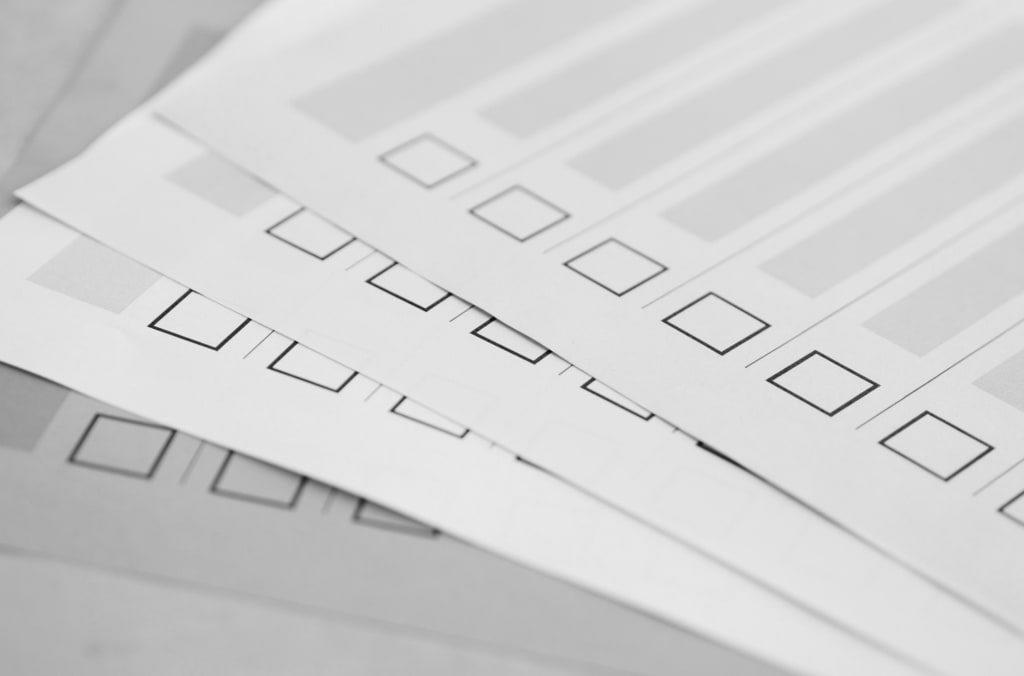The Woman's Reprieve
Elegy from a Waiting Room

The Woman’s Reprieve
I
On no particular day, a very ordinary woman sat rewriting her own personal history.
The pen felt heavier than usual, and there was a sense that she had to carve each line into the paper rather than simply filling in the form, ticking and crossing her way into the life she was soon to live. With the surrounding waiting room left bereft of her attention, the pause and play of ink scratching the page gave a definite sense to each stroke. These were no doubt symptoms of the gravitas of her choices, with her inner turbulence unveiling itself in the twiddling of a heart-shaped locket between her fingers, a relic of a time before. A better time, before the fallout of the present.
She turned the page over to discover the word YEAR stamped atop it, and a list of digits below, stretching from 1900 to present. So much choice, her mind sardonically retorted. Without hesitation, she drew a ring of jade around the number 1967. The woman did so, among other reasons, because she could no longer stand the objective, binary nature of her own time. She believed it had become task enough to stay sane before trauma or tragedy, and she had endured those in excess. And so, quite blamelessly, the woman now longed for days in flux, punctuated only by the crackling of the needle on the slow revolutions of smooth vinyl. Days in the reverie of a sixties haze, with photographs that had such a honey-like quality as to create the effect that they had successfully trapped sunlight. Above all, she had been driven to lust after impracticality. It would not be mere nostalgia if she had never known it any other way, and that was precisely the point of the procedure. With her memory cleared, the wounds of her past would cease to exist, vermillion watercolours washed away in the rain, and she could return to a life perfectly choreographed and orchestrated by her past self. She had selected the job, the neighbourhood, the house, the decoration – even to the flowers in the centre of her kitchen table to be - weeks in advance, and so the majority of this last meeting was mere performative formality. A final perusal of the script, before taking to the stage.
Now it was just a matter of forgetting.
It had not been an easy decision – she was rather old-fashioned for her time – but grief and sorrow were creatures she could no longer bear to sleep with. A friend had recommended the procedure over coffee upon noticing the cuts on both of her arms. They had finally given her act away, cracks in the faux marble sculpture she had meticulously presented to the world, and the crimson dye that came from therein was simply unsanitary to its cruel eyes. The idea of forgetting had seemed utterly trivial to her at the time, first laughed at, then swept away masterfully in conversational insouciance. After all, it was both a most criminal act of self-deception, and an exhibition of disregard for those who deserved to live, even if only in her memory. But, as one must take a book off the shelf to brush away with the dust, did that recommendation incur febrile consideration of her friend’s proposal. Time let it inflate in her mind, and the pressure it forced on her from within was only released when she booked her first appointment.
She had chosen to forget because she was a casualty of war. Not the kind of casualty that has fought on the battlefields, or even pushed plastic around a map. She was the kind of casualty that would be found under the heading COLLATERAL DAMAGE. An innocent victim of powerful, typically greying, and elderly men with empty promises loosely tied to rash, capricious decisions. The War That Levelled had done exactly that in more ways than one. For example, although the world conflict’s official title made reference to the societal restructurings and reforms it elicited, the three apartment floors below hers that had caved in following missile fire could have quite accurately been described as levelled. Furthermore, the very same summation could be applied to the flat, faceless surfaces of the two graves – barely identifiable among hundreds of thousands of others – below which presently lied the remains of the woman’s husband and daughter. The crashes and screams of that day had resonated through every fibre of her life since - sometimes tremors, more often quakes. Trivial occupation could ring louder than them occasionally, but when left only in the company of her thoughts, their invasive cries were cutting, unbearable. Her stars had been ripped from the sky, and the tears in its fabric could not cease to hang over her. So much choice?
II
It was thus she found herself sat in this very waiting room, which she now noticed for the first time. The dynamic was that possessed by a nervous, frenetic handshake - overly rough for fear of being so. The light of it wore a stagnant pallor, and the empty porcelain vases that lined the coffee table in tally with the glass sculptures of sponsors in the window bays left only a fragrance that its promises could be fulfilled, its patients saved. However, the real singularity around which the room orbited was the nameless tension visible to all within. He had no fixed face, no eyes, but he looked down upon them all as the hospital’s cruel taskmaster – you will find him in the waiting rooms of every medical institution – and his gravitas was suffered by all, silent and still. Under this weight, the brittleness of circumstance became plain to her, codified in the uneasy glances that would occasionally skim past each other, and the metronomic quality portrayed by one man’s tapping feet.
Her train of thought could go no further before she was interrupted by the flinging open of a door with such vehemence as to send energy rippling through the room. The character that entered thereafter was of a similar drama. Adorned with an ebony three piece, crowned with the magnificence of a top hat, this gentleman strode in accompanied by precisely nothing, whilst giving the impression of having the historians at his coattails. With immense direction, he placed himself directly beside the woman. Her bewilderment was not hers alone. It was all too easy to forget that some chose to live so high on the page; apparently, this man was one of them.
“First time?”
“Couldn’t tell you”
“Ah!” He smiled a knowing smile, and let the flavour of her remark settle, before offering his criticism. “In that case, it most certainly is. You see, my dear, just because you do not remember it, doesn’t mean it didn’t happen. By law, someone somewhere has a record of it. Surreal as it may be, we live in such a time where they can know more about us than we do about ourselves. Hence it is written in legislation that we must be told about our previous conquests every time we choose to forget – you have not done so before, so you have nothing to be told; in which case the memories you have are pure, unadulterated! What a thing of majesty that is!” The racing grin he had begun to wear slipped back inside itself behind a cold epiphany, his eyes that bit dimmer as he proceeded. “I, unfortunately, cannot say the same – this will be my seventh operation. The beautiful irony being that until approximately five minutes ago I knew none of this, and in approximately fifteen minutes, I will know none of this.”
The salvo of opinion she had undergone had left her a little flummoxed. Floundering, her eyes searched for direction on the floor, the walls, and found it in the face of the man who had delivered it. Before long, the woman had distilled her bewildered sentiments into a matter of syllables. “Seven times?”
“Oh indeed, in seven different decades too; I really have got around, so to speak. Seems I don’t know myself too well, do I now? Ha! Take this last one – 1918 – should have been fantastic, but for some reason another version of myself decided I ought to try my hand at being a writer. Needless to say, I really wasn’t very good at it. Diversity of imagination failed by the vernacular of a child. Tragic stuff really. You only remember the essentials, you see, and verbosity is not accommodated for under such a classification – it is up to you to read your way back into it. Anyhow, though you are a saint to listen so politely – what need have we for confession nowadays? – I am frighteningly late, so I really must dash. Best of luck with your endeavours! I hope your first time is your last! May we meet in better circumstances, and have a chance for better first impressions! Adieu! Adieu!”
And with that, the gentlemen surged upwards, and strolled toward the door that guarded the treatment beyond. Its ivory shade gave it arms that seemed to welcome, or to ward. The woman, still in a state of bamboozlement, could not help but meditate on the absurdity of the encounter. A laugh rippled out of her, throwing her head back in an exhibition of ephemeral carelessness. Strange piece of work, thank heavens I won’t be speaking like that in my time, she chortled, and as she slumped back into her chair, it seemed tension’s dark figure had been escorted elsewhere in the hospital. And yet, only with the peace of mind brought by this peculiar man’s light relief, could she truly comprehend the magnitude of what she was about to do. It is a well-known fact that the sugar of humour is particularly necessary as wrapping for the most bitter of truths, and in a matter of moments, the fragility of things washed over her. Soon, she would no longer be affiliated with identity – not merely her own, but that of her time.
Worse still, with an erasing of her worst memories, came an extirpation of her best. As every scream became oblivion, so too did every first time become its last, no longer burdened to replay on queue for her. Such disturbing revelations played elegies as her sense of touch returned, remembering the paper form in front of her, and the necklace that lay around her neck – a most precious gift sealed with the raw emotion only observable in romances that begin in and bloom beyond childhood. Regret was a cold shower, and she sat in shock. Never had time been so tangible for another as when she held history in her hand and the future between her fingertips.
This macabre pondering was interrupted by the doctor calling on her. He was a man who carried advert politeness with him everywhere but behind closed doors. The smile he wore, whilst tried and tested, was that bit plastic as to alert the observer that it was obscuring something rather horrifying.
In a moment of extreme brevity, the woman arose, and let herself be carried by the magnetism of her new future, pressing mute on the white noise behind. With her eyes fixed on the ceiling, she paid her respects to those who had once been all she had in the tears that involuntarily rolled down her cheeks. The kisses she lay on her locket condensed the sentiments of a lifetime, and her hand stuttered as she placed it in the box of belongings not to be returned.
A few surreal moments later, the procedure was over.
I hear she’s happily married these days, and occasionally enjoys taking her children to the vinyl store between shifts.
About the Creator
Enjoyed the story? Support the Creator.
Subscribe for free to receive all their stories in your feed. You could also pledge your support or give them a one-off tip, letting them know you appreciate their work.






Comments
There are no comments for this story
Be the first to respond and start the conversation.